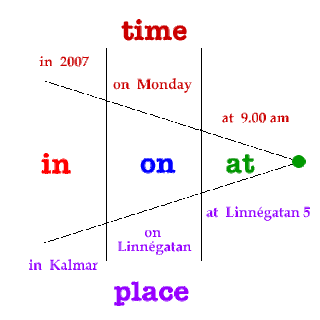This was the first time you've submitted formal English to us, so it's not surprising that there are one or two points which generally weren't exactly right first time round! One point to bear in mind, though, is that I've marked every single error. Not all of these errors, however, are important (choosing the wrong preposition is very easy to do and is rarely crucial to meaning). Here are seven of the commonest 'frequently-made mistakes', which you are encouraged not to make again!
1. I've often referred to 'colloquial language' (such as the use of words like 'get' and 'big'). This is language which is normally spoken, rather than written. It isn't slang, because every user of the language understands it (i.e. not just some closed group), but it isn't usually written down. Everyone knows, for example, that 'buck' is the word for a US dollar, but your contract of employment will specify your salary in 'dollars', not 'bucks'.
If you're unsure about what's colloquial and what's not, ask your Internet Tutor.
2. Capital letters cause problems - even for native speakers. Consider this sentence: "She used her studies of Psychology to use psychology to change her boss' mind". Why is there a capital letter on the first 'Psychology', but a small one on the second one? (The answer is that the first one is an academic subject, whilst the second is the general phenomenon of manipulating people mentally!). All the 'information words' in job titles need capital letters (Manager of Port Services - 'of' is there for grammatical purposes, not for the purpose of adding to the information in the title), as do all the ones in names.
There's an exercise about capital letters in Module 1.
3. 'Verbs in phase' is the technical name for using two verb forms together. Take a look at these two:
a. She stopped to speak to him.
b. She stopped speaking to him.
There's clearly a major difference in meaning between them … but many languages lack an '-ing' form which English uses all the time, so the distinction between something she did (stopped) in order to do something else (speak to him) and something she did over a period of time (stopped speaking to him) is difficult to make so succinctly.
Then you've got another problem: 'to' is sometimes part of a verb (to speak) and sometimes it's a preposition which indicates something like movement towards. An '-ing' form can sometimes have the function of a noun too (Swimming keeps you healthy). Take a look at these two:
c. I'm looking forward to your party.
d. I'm looking forward to seeing you at the party.
In (d) 'seeing' is actually a noun-form - it's what you're looking forward to.
4. Short forms (I'm, don't, etc) shouldn't be used in formal writing either.
Then there are three very specific frequently-made mistakes:
5. In/on/at are often mixed up, particularly when you're referring to time and space. You use 'in' for the big unit, 'on' for a smaller one, and 'at' for a point in time or space, like this:
6. Don't call yourself a 'boy' or a 'girl' in a business context, unless you want to stress your immaturity and extreme youth (say, 9 years old!). Women have struggled hard against sexism for decades, so feel proud to call yourself a 'woman' (if you are one!).
7. The names of Swedish administrative units are sometimes difficult to translate (since each country has its own system. A 'kommun' is usually a 'Council' in English, whilst a 'län' is a 'County'. A 'commune' is a hippy collective of the sort that died out in the 1970s!
Good luck with Send-In 1!

No comments:
Post a Comment